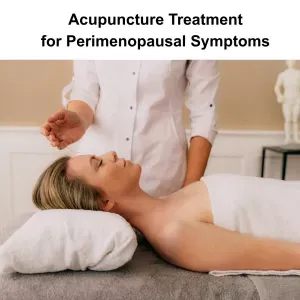By Xiaomei Cai, L.Ac., Ph.D. and Qineng Tan, L.Ac., Ph.D.

Changes in mood, sleep, energy levels, or menstrual cycle? Hot flashes, itchy skin, or joint pain? These can all be signs of perimenopause, the transitional period leading up to menopause. Acupuncture and Traditional Chinese Medicine (TCM) provide a holistic approach to managing perimenopause symptoms.
While everyone experiences the perimenopause transition differently, it is common to have disruptive perimenopausal symptoms that can affect your physical and emotional well-being. Acupuncture and herbs can help balance hormones, regulate the menstrual cycle, reduce stress, restore energy, and improve your quality of life.
What Is Perimenopause?
Perimenopause refers to the years leading up to menopause, when hormone levels, particularly estrogen and progesterone, begin to fluctuate. This transition often begins in a woman’s 40s, but can start earlier.
Perimenopause can last several years, with symptoms gradually intensifying until menstruation stops completely. “Menopause” is defined as having gone 12 months without a period, which means it technically is just one day! Most people with periods will experience perimenopause for years, and then be “post-menopausal” for up to a third of their lifetime.
Some doctors will recommend hormone replacement therapy (HRT) or medications to target specific symptoms. For some women, HRT is not recommended, due to their medical history. And some women prefer natural, non-pharmaceutical approaches.
Acupuncture and Chinese herbal medicine work by addressing the underlying imbalances that contribute to perimenopausal symptoms, offering a safe and effective alternative or adjunct treatment to hormone therapy.
Top 12 Most Common Perimenopause Symptoms

TCM practitioners look for diagnostic patterns based on the range of symptoms an individual is experiencing and then creates a treatment plan to balance the organ systems and correct the root problem that is causing them. With menopause and perimenopause, typical TCM diagnosis might be:
- liver and kidney yin deficiency
- kidney yang deficiency
- both yin and yang kidney deficiency
- disharmony of heart and kidney
- liver stagnation and spleen deficiency
- stagnation of liver qi
Insomnia
Trouble falling or staying asleep is one of the most common complaints in perimenopause. In TCM, sleep disruption often reflects Yin deficiency (lack of cooling, nourishing energy) or Heart–Kidney disharmony. Acupuncture helps calm the Shen (spirit) and regulate the nervous system, while herbal formulas and dietary guidance focus on nourishing Yin and calming the mind. Simple lifestyle suggestions—reducing late-day stimulants, winding down with gentle stretching or qigong, and keeping a cool, dark bedroom—are part of an integrated plan.
Anxiety
Perimenopausal anxiety often shows as persistent worry, tension, or a feeling of being “on edge.” From a TCM point of view this is frequently Liver Qi stagnation or Heart Shen disturbance. Acupuncture points to move Liver Qi and settle the heart, paired with calming herbs and breath-work, can substantially reduce anxiety and the physical tension that accompanies it.
Depression
Low mood or persistent sadness (depression) may be linked in TCM to Liver Qi stagnation, Spleen Qi weakness (fatigue and poor appetite), or Heart blood deficiency. Treatment is individualized: acupuncture to regulate the flow of Qi, herbal formulas to strengthen the Spleen and nourish the Heart, and lifestyle counseling—regular movement, sunlight, and social support—are all used to lift mood and restore resilience.
Itching / Pruritis
Itchy skin in perimenopause can be triggered by hormone-related dryness or underlying heat from Yin deficiency. TCM treats this by nourishing Yin, clearing deficient heat, and resolving any skin dampness. Topical herbal washes, internal formulas that nourish fluids, and acupuncture to balance the Skin and Lung channels are commonly used approaches.
Joint Pain (including hip and shoulder pain, frozen shoulder)
Joint aches and stiffness often flare during perimenopause, due to declining Yin and Lubrication for the tendons and joints. TCM diagnoses may include Wind-Cold-Damp invasion or Kidney/Liver deficiency affecting the sinews. Local and distal acupuncture, moxibustion when cold is involved, herbal anti-inflammatory formulas, and therapeutic tuina or gentle mobilization help reduce pain, improve circulation, and restore range of motion.
Hip Pain
In TCM, hip pain is frequently associated with Kidney deficiency (which governs the bones and joints) or Blood stasis. Treatments focus on nourishing Kidney essence and moving blood to relieve stiffness and referred pain. Clinical outcomes are often improved when acupuncture is combined with targeted exercises for hip stability.
Shoulder Pain / Frozen Shoulder
Frozen shoulder is treated as a painful obstruction (a kind of Bi syndrome) in TCM. Needling local shoulder points together with distal points that move Qi and break up stagnation can help restore mobility. Repeated, gentle treatment sessions with acupuncture, adjunct cupping or gua sha, and rehabilitative stretching often bring gradual, sustained improvement.
Acne
Hormone-driven acne in perimenopause can result from Liver Qi stagnation transforming into Heat or from Phlegm-Damp accumulation. TCM treatment clears Heat, transforms Phlegm, and supports digestion (the Spleen) so skin eruptions calm. Herbal formulas tailored to the pattern, dietary adjustments (reducing spicy/fried foods and dairy for some people), and acupuncture to regulate hormones are commonly used.
Brain Fog
Difficulty concentrating, forgetfulness, and mental fog often accompany hormonal transitions. In TCM this can be modeled as Qi and blood not adequately nourishing the brain (the “Sea of Marrow”), or as Kidney essence declining. Acupuncture to improve circulation and nourish Yin and blood, herbal support to improve mental clarity, and lifestyle strategies (sleep hygiene, structured routines, mild aerobic exercise) are used together to sharpen cognition.
Irregular Periods
Perimenopause often brings irregular cycles, heavier or lighter bleeding, and spotting. In TCM irregular menses result from Liver Qi stagnation, blood deficiency, or Yin-Yang imbalance. Treatment aims to regulate the menstrual cycle by harmonizing Liver and Spleen, nourishing blood, and, when needed, cooling excess heat. Acupuncture can help re-establish more predictable cycles over time while herbs address the underlying pattern.
Fatigue
Persistent low energy is commonly related to Spleen Qi deficiency in TCM (poor digestion and energy extraction) or to Kidney depletion. Acupuncture protocols focus on strengthening Spleen Qi and boosting overall vitality; herbs like astragalus-based formulas and dietary adjustments—regular, nourishing meals—support long-term recovery.
Hot Flashes and Night Sweats
Perhaps the most classic perimenopausal complaint, hot flashes reflect Yin deficiency with relative heat in TCM theory. Acupuncture has a strong evidence base for reducing the frequency and severity of hot flashes by modulating autonomic balance and calming the underlying deficient heat. Herbal formulas that nourish Yin and clear deficient heat, combined with dietary/lifestyle strategies (cooling foods, layered clothing, avoiding triggers), round out the approach.
Can Acupuncture Help Perimenopause?

Multiple clinical trials and systematic reviews support acupuncture’s effectiveness for common perimenopausal symptoms. For instance, a randomized controlled trial examining perimenopausal insomnia found that acupuncture significantly improved sleep quality, total sleep time, and reduced time to fall asleep compared to control groups. Another systematic review evaluating acupuncture for comorbid insomnia and depression reported moderate to strong benefits in sleep metrics and mood with low risk of adverse events.
In addition to the sleep and mood benefits, acupuncture has been studied for vasomotor symptoms (hot flashes). A meta-analysis pooling several trials showed that acupuncture reduced the frequency and severity of hot flashes more than sham acupuncture and often matched hormone therapy in effect size, with fewer side effects. These studies underscore acupuncture’s potential not only to alleviate surface symptoms but also to exert beneficial regulatory effects on hormonal and autonomic systems.
Perimenopause is a highly individual transition; two people can have the same complaint (like insomnia or hot flashes) for very different energetic reasons. That’s why TCM emphasizes tailored treatment—your acupuncture points, herbs, and lifestyle plan are selected based on your unique pattern. Acupuncture offers real physiologic benefits (calming the nervous system, improving sleep architecture, reducing inflammation) while herbs and diet support deeper rebuild of Yin, Blood, and Digestive Qi. Regular treatments over several months are often most effective, with maintenance “tune-ups” to keep symptoms at bay.
If you’re struggling with perimenopausal symptoms, acupuncture and TCM can be a safe, effective complement to conventional care. At Art of Wellness we create personalized plans that combine acupuncture, Chinese herbal therapy, nutritional guidance, and qigong to help you move through this transition more comfortably and regain balance.
Acupuncture Near Me for Perimenopause in West Los Angeles
If perimenopause is impacting your sleep, mood, skin, joints or day-to-day energy, please don’t hesitate to reach out. We’re happy to schedule a consultation to review your symptoms, discuss a personalized TCM treatment plan, and answer any questions about how acupuncture and herbal medicine can support you through this phase of life. Call or book online to get started.
At Art of Wellness Acupuncture in Santa Monica, we specialize in women’s health and menopause care. If you are experiencing symptoms of perimenopause, reach out today to schedule a consultation. Together, we can create a personalized treatment plan to help you feel more like yourself again.
*This article is for education from the perspective of Traditional Chinese Medicine only. The education provided by this article is not approved by FDA to diagnose, prevent, treat and cure human diseases. It should not stop you from consulting with your physician for your medical conditions. Traditional Chinese Medicine is based on Qi, which is an invisible force that usually cannot be observed by modern science. Because science focuses on testing ideas about the natural world with evidence obtained through observation, these aspects of acupuncture can’t be studied by science. Therefore acupuncture and Chinese herbs are often not supported by double-blind, randomized trials, and they are considered alternative medicine therapies in the United States.
